 |
Faith under Attack
“God must die so the new man can live free”
Nietzsche, Herald of the Revolution’s Pride
Julio Alvear, Spain
At times it is useful to re-read Friedrich Nietzsche (1844-1900). His thinking is representative of the current of Modern Philosophy that exalts the essence and final goals of the Revolution.
We understand Revolution – in the sense defined by Plinio Corrêa de Oliveira – as an massive process of tendencies, doctrines and political, social and economic transformations deriving from a moral deterioration generated by two fundamental vices: pride and impurity. These vices produce in man a profound incompatibility with Catholic doctrine.
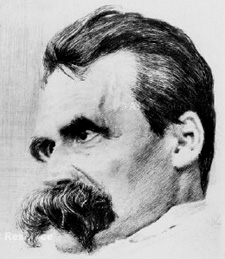
His thinking: an explosion of pride |
From this pride and impurity comes a conception of the world diametrically opposed to the work of God. Such a conception does not just differ from the Catholic view in only this or that single point. Through the generations, these vices become more profound and generate a whole Gnostic and revolutionary conception of the universe. Historically, the first steps of this conception were taken first in the Renaissance and then in 16th century with Protestantism. Today this process is reaching its consummation with the apostasy of the once Catholic nations.
Nietzsche: ‘Prophet’ of the Modern Age
We do not consider Nietzsche a great metaphysical thinker in the classic sense of the term. He provides a useful example, however, to show a goal of the Revolution.
His pen expresses an impassioned admiration for the old Paganism: he gave a new artificial energy to its resurrected myths (the eternal return, the Dionysian vision of life, etc). Such views reveal a thought devoid of any systematic methodology but rich in aphorisms, metaphors and allegories that speak of his hatred for Our Lord, the Papacy, Christianity and philosophical and theological truth. For example, he introduced the notions of the death of God, the superman, and the will to power, vigorously attacking Christianity as moralities for the weak herd.
This hatred that denies the past as the bearer of Christian tradition and presents the new future as the fruit of a revolted struggle against God – like Prometheus who tried to steal fire from heaven in the ancient myth - is typical of the Revolution. Such hatred is reflected more in Nietzsche than almost any other thinker, except perhaps Feuerbach or Sartre.
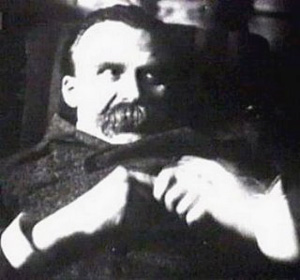
Nietsche presents the future as fruit of a revolt against God |
Nietzsche is, in this respect, a visionary of a work that the Revolution wants to complete in our days and a troubadour of one of its propelling vices – pride, hubris. He takes this pride beyond the individual sphere, making it a metaphysical value, a universal principle whereby everyone should reject the order of the universe as it was created by God.
We don’t pretend to make a full analysis of this theme in this short article. We will simply limit ourselves to show the beginning of the thread of the Nietzschean skein with regard to pride.
We ask the reader to take the time to read some brief excerpts from two of Nietzche’s works that are rich in revolutionary meaning. It is something like a test – a test regarding the position of your own soul before the great theme of modern man who in his actions and thinking pretends to topple God. Try to discern what Nietzsche is announcing as a “prophet” of the Revolution.
The madman declares the death of God
The first text comes from the The Gay Science (Die fröhliche Wissenschaf - 1882). This excerpt is number 125 in the compilation of Walter Kaufmann (1960), and is entitled “The Madman.” (1) Nietzsche writes:
Have you not heard of that madman who lit a lantern in the bright morning hours, ran to the market place, and cried incessantly: "I seek God! I seek God!" As many of those who did not believe in God were standing around just then, he provoked much laughter. Has he got lost? asked one. Did he lose his way like a child? asked another. Or is he hiding? Is he afraid of us? Has he gone on a voyage? Has he emigrated?
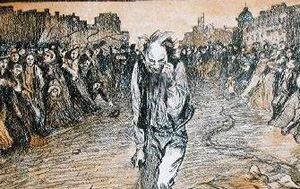
The madman rejected by the crowd |
Thus they yelled and laughed.
The madman jumped into their midst and pierced them with his eyes. "Whither is God?" he cried; "I will tell you. We have killed him - you and I. All of us are his murderers.
"But how did we do this? How could we drink up the sea? Who gave us the sponge to wipe away the entire horizon? What were we doing when we unchained this earth from its sun? Whither is it moving now? Whither are we moving? Away from all suns? Are we not plunging continually? Backward, sideward, forward, in all directions? Is there still any up or down? Are we not straying, as through an infinite nothing? Do we not feel the breath of empty space? Has it not become colder? Is not night continually closing in on
us? Do we not need to light lanterns in the morning?
“Do we hear nothing as yet of the noise of the gravediggers who are burying God? Do we smell nothing as yet of the divine decomposition? Gods, too, decompose. God is dead. God remains dead. And we have killed him. How shall we console ourselves, the murderers of all murderers?
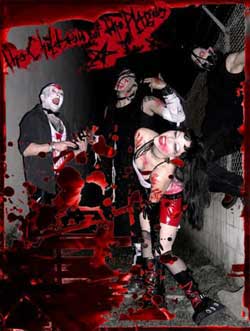
"Must not we ourselves become gods?"
A revolt that ends in Satanism |
“What was holiest and mightiest of all that the world has yet owned has bled to death under our knives: who will wipe this blood off us? What water is there for us to clean ourselves? What festivals of atonement, what sacred games shall we have to invent? Is not the greatness of this deed too great for us? Must we ourselves not become gods simply to appear worthy of it? There has never been a greater deed; and whoever is born after us - for the sake of this deed he will belong to a higher history than all history hitherto."
Here the madman fell silent and looked again at his listeners; and they, too, were silent and stared at him in astonishment. At last he threw his lantern on the ground, and it broke into pieces and went out.
"I have come too early," he said then; "my time is not yet. This tremendous event is still on its way …”
On the same day the madman forced his way into several churches and there struck up his requiem aeternam Deo. Led out and called to account, he is said always to have replied nothing but: "What after all are these churches now if they are not the tombs and sepulchers of God?"
God has died in Thus Spoke Zarathursta
The second group of texts is from the well-known work Thus Spake Zarathursta (1885),(2) from which we have selected six paragraphs from various parts of the work:
* Zarathustra went down the mountain alone, no one meeting him. When he entered the forest, however, there suddenly stood before him an old man, who had left his holy cot to seek root in the forest . …
"And what does the saint do in the forest?" asked Zarathustra. ... The saint answered: "I make hymns and sing them … thus do I praise the God who is my God.”
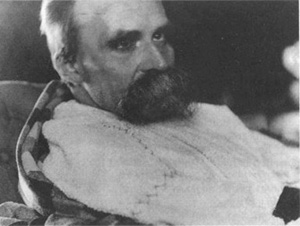
Nietzsche ended his life mad.
Above, in 1899, a year before his death |
But when Zarathustra was alone, he said to his heart: "Could it be possible! This old saint in the forest has not yet heard of it, that God is dead!” (Prologue of Zarathustra, 2)
* And it is the great noontide, when man is in the middle of his course between animal and Superman, and celebrates his pathway to the evening as his highest hope: for it is the pathway to a new morning. At such time will the down-goer bless himself that he should be an over-goer; and the sun of his knowledge will be at noontide.
"Dead are all the Gods: now do we desire the Superman to live." Let this be our final will at the great noontide! (Part I, The Virtue that Bestows Gifts, 3)
* God is a conjecture: but I do not wish your conjecturing to reach beyond your creating will. … Could ye conceive a God? - But let this mean Will to Truth for you, that everything be transformed into the humanly conceivable, the humanly visible, the humanly sensible! You shall follow your own discernment to the end! And what you have called the world shall but be created by you …
But that I may reveal my heart entirely unto you, my friends: if there were gods, how could I endure it to be no God! Therefore there are no gods.
Yea, I have drawn the conclusion; now, however, it doth draw me …
The beauty of the superman came unto me as a shadow. Ah, my brethren! Of what account are now - the gods to me! (Part II, In the Happy Isles)
* "What doth all the world know at present?" asked Zarathustra. "Perhaps that the old God no longer lives, in whom all the world once believed?"…“Away with such a God! Better to have no God, better to set up destiny on one's own account, better to be a fool, better to be God oneself!" (Part IV, Jubilado)
* “The God who beheld everything, and also man: that God had to die! Man cannot endure it that such a witness should live." (The Ugliest Man)
* “Now however this God hath died! Ye superior men, this God was your greatest danger. Only since he lay in the grave have ye again arisen. Now only the great noontide comes, now only does the superior man become - master!
Have ye understood this word, O my brethren? Ye are frightened: do your hearts turn giddy? Does the abyss here yawn for you? Does the hell-hound here yelp at you?
Well! Take heart! ye superior men! Now only travails the mountain of the human future. God has died: now do we desire - the Superman to live. (The Superior Man, 2)
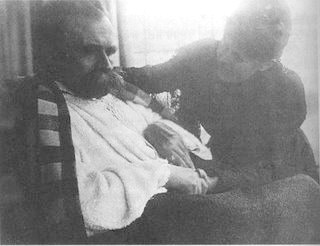
In his last years, under the care of his sister |
Nietzsche ended his days mad. In fact, he signs some of his letters with “god” or “the crucified.” It is a telling moral lesson that needs no further commentary.
Without doubt, even with his progressing madness, Nietzsche saw certain things. Culturally speaking, he lived in a Protestant world asphyxiated by incredulity and rationalism; a world where that false religion offered no answer to anything. Faced with Catholicism – strong in its magnificent counter-revolutionary action of the second half of the 19th century - Nietzsche revolted against it and, without any evidence, declared its death. In Thus Spoke Zarathustra the last Pope speaks at the feast of the ass, an ironic commentary on how empty religion would become in face of the autonomy of modern man and civilization.
A new era based on Satan’s Non serviam
The German philosopher announced that the religious man would perish in the new civilization. He announced that the modern times had produced the death of God. God died because men killed him. How? By affirming their liberty before Him and asserting the power of their rationality. Thus Nietzsche announced the dawning of a new man who invents himself with his will to power, liberating himself from the chains of the Christian virtues that bind him to resignation and death.
In Thus Spoke Zarathustra one sees the messianic expectation of a grand new day to come for mankind, something that has already arrived for the illuminated. He states: “And it is already the great noontide,” that is to say, the realization of the expected kingdom of God on earth is already drawing near and will be achieved by the hand of man alone. God is no longer necessary. We can make our own happiness without Him.
From the theological point of view, this affirmation of Nietzsche is highly expressive: “If there were a God, how could I endure it to be no God?” We see the pride of the fallen Angel coming from the lips of a man. By his nature man feels himself finite and limited. For this reason, he turns naturally toward God in a religious attitude of humility.
But Nietzsche situates the rebellion of man on a different plane – that of the Revolution and the Luciferian shout of revolt: “Since I cannot bear not being God, then there is no God.” The German philosopher uses the perverted logic of an egalitarian pride where the creature denies his own condition before his Creator. At its most profound level, what he is saying is this: “I am pride. I am rebellion. I am the Revolution.”
How did we reach this extreme? St. Augustine, who understood the human heart so well, explains that when man lives for himself and not for God, he lives according to Satan. The only truth becomes what I want. Departing from this desire, a whole world is constructed as if God did not exist. Further, if what I want is not according to what God wants, then it is necessary to deny God. This rebel thinking knows no limits. It follows the action of Satan who exalted himself in the place of God: Non serviam [I will not serve].
The Revolution follows Nietzsche’s path

Today's revolt reaches new heights of hatred. Above, at a gay parade in London |
This is one of the great promises the Revolution makes to delude modern societies: “If you want to be free, abandon the Commandments of God and the counsels of the Church.” Nietzsche was one of the heralds of this thinking on the philosophical level: It is necessary that God die so that the new man can live free.
But what Nietzsche could only shout, others after him are gradually executing with that same radical intent. What are a government, an economic policy and a society without God if not the realization of the Nietzschean motto? This is the sad history of the 20th century that continues in this new century.
St. Augustine warned man and society: “You lost yourself to find yourself, and became a slave of those things outside yourself.” That is to say, you have abandoned the vocation God gave to you in order to seek yourself independent of Him, but you only enslavered yourself to the Devil, world and flesh.
This last consideration shows us that the supposed liberty promised by the Revolution has enchained modern man in a supreme agony.
1. Friedrich Nietzsche, The Gay Science (1882, 1887) para. 125; Walter Kaufmann ed. (New York: Vintage, 1974), pp.181-82.]
2. Thus Spake Zarathurstra
The photos of Nietsche shown here belong to the series Der kranke Nietzsche of Hans Olde, taken in June and August of 1899. Original in Goethe und Schiller Archiv Weimar)

Posted on November 26, 2008

Related Articles of Interest
 Luther - No! Absolutely No! Luther - No! Absolutely No!
 The October Revolution The October Revolution
 Bad Creations of the Conciliar Popes Bad Creations of the Conciliar Popes
 Clash of Gothic and Cartesian Mentalities Clash of Gothic and Cartesian Mentalities
 Critique of Benedict XVI's Deus Caritas Est Critique of Benedict XVI's Deus Caritas Est
 Zarathustra and Vatican II Zarathustra and Vatican II
 Revolution and Counter-Revolution: An Overview Revolution and Counter-Revolution: An Overview

|
Faith under Attack | Religious | Home | Books | CDs | Search | Contact Us | Donate

© 2002-
Tradition in Action, Inc. All Rights Reserved
|
 |
|